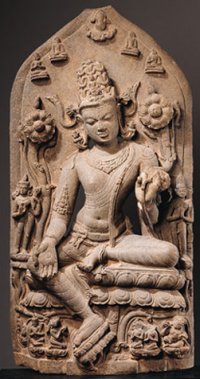AVALOKITEŚVARA

Avalokiteśvara is the most important and also the most beloved of all the bodhisattvas in Mahāyāna Buddhism. His name is made up of two Sanskrit words, avalokita meaning ‘to look upon’ or ‘to survey’ and iśvara meaning ‘lord.’ Thus, Avalokiteśvara is that noble being who looks out across the world, sees all its pain and suffering and, moved by compassion, tries to relieve it. Avalokiteśvara’s origins are obscure, but his presence began to be noticed around the 1st century BCE. The earliest mention of his name is in the Saddharmapuṇḍrīka Sūtra, which was composed in about the 1st or 2nd centuries CE. He was probably a person born during the time of the Buddha, who heard his teachings and, having made a strong and sincere vow to attain enlightenment (adhiṭṭhāna) for the sake of all beings, was reborn in a heavenly realm from where he responds to people’s distress.
Since Avalokiteśvara’s appearance, millions of people who have called upon his name have been cured of physical and psychological illnesses, saved from disasters and comforted in times of loneliness and despair. Some divine beings are worshiped with ‘fear and trembling’ because they are supposedly ‘almighty,’ but it has always been Avalokiteśvara’s gentleness and compassion that have drawn people to him. One might even say that Avalokiteśvara is the very personification of the Buddha’s healing and nurturing compassion.
Avalokiteśvara is usually depicted as a beautiful graceful youth of gentle demeanour, although in Chinese, Korean and Japanese iconography he is often shown as a female. Of course, this is just iconographic convention; having transcended gender, Avalokiteśvara is actually neither male nor female. After about the 7th century, the Chinese began depicting Avalokiteśvara with a thousand arms, the palm of each hand with an eye in it. This was an imaginative way of expressing his deep desire not only to see the distress of beings but also to reach out and to help alleviate it.
Avalokiteśvara is known in Chinese as Kuan Yin, in Japanese as Kannon, in Tibetan as Chenrezi, in Vietnamese as Quan Am and in Sinhalese as Nātha. Tradition says Avalokiteśvara has 108 names. See Laughing Buddha, OM MAṆI PADME HŪM and Potala.